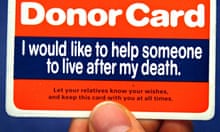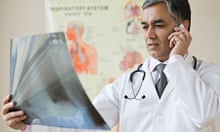The health and care system is heading for a crisis, unless it changes the way it works. Shrinking budgets and increasing demand on services make this no baseless warning from Norman Lamb, the care services minister. But while digitisation has revolutionised many transactions for British citizens, making services more accessible and efficient, it can seem as if digital transformation has passed health and social care by.
A Guardian Healthcare Professionals Network seminar – supported by EMC, Fortrus and the National Institute for Health Research Clinical Research Network– focused on how the digitisation of services will transform health and social care. Chairing the event, the commentator and journalist Richard Vize said our health and care system is advanced at collecting and publishing data, but “only at the foothills of exploiting its full potential”.
Vize regretted that much of the reporting and discussion around data was focused on the more difficult areas: whether it’s the NHS National Programme for IT, the misreported whole system demonstrator for telehealth, or the continuing debate around the care.data programme.
“Tonight we will be looking at the potential of these extraordinary databanks. And one can see a world which will be very different from the one we are now living in,” Vize told the audience.
“For example, data-driven GP diagnostics; widespread use of telehealth and telecare, which is beginning to make a big difference in several areas; real-time monitoring of epidemics; and the use of international data sets for the diagnosis and treatment of specialist diseases.”
Panellists spoke of the barriers to achieving this vision. Orlando Agrippa, a deputy chief information officer in the NHS, said he had worked in 14 hospitals and none of the executive teams put data “in the really important camp”. Key to this, in Agrippa’s view, is that these teams had not seen big examples of how digitisation could transform healthcare.
A “grave concern” for Di Millen, informatics leadership and development lead at NHS England, was that the health and social care system does not ensure clinicians get the education and training to work in an environment where digital services are core. Furthermore, the professional skills of informatics specialists go largely unrecognised, she lamented: “If we don’t expect our information and IT specialists to be appropriately qualified, accredited and to keep up-to date professionally, then we are creating problems for service users and for the system as a whole.”
Adam Steventon, head of data analytics at the Health Foundation, said: “The problem at the moment is that data is fragmented and not aligned around the patient … And the patient is not really put in a position of knowing why their data is used and for what.”
Health and social care are fundamentally information-based industries, in which millions of decisions are being made, said panellist Mark Davies, medical director of Medeanalytics.
He told the audience: “Those decisions need to be made on evidence, the foundation of which needs to be actionable information. I would put it to you that the most valuable thing in the NHS is the staff, but the second most valuable thing is data.”
During the debate, one network member commented that the “real challenge” was collecting data at the point of patient care. “I don’t think that any acute trust in the country has the headroom to do this at the moment,” he said.
So what will enable a digital revolution in the field? Agrippa pointed to the need for a change in the attitudes of social care leaders, but he emphasised that, in healthcare, it was patients who would drive change.
Asked by Vize whether the growing personalisation of mobile technology and access to health information was largely middle-class, Agrippa said he didn’t think it was about class, but emerging technology and a younger population who were driving change and bringing older people with them.
“Generation Z are coming with something very different; they don’t want what we have had, they want something new,” he argued.
Millen flagged up that this year NHS patients will start having online access to their GP summary care records. This, she said, had the potential to change the paradigm from paternalism to partnership, with significant impact on the way clinicians behave and communicate.
The discussion turned to hack days, described as events where bright – usually young – people take gritty problems for clinicians and produce fantastic solutions. The drawbacks are a lack of venture capital, route to market and poorly developed networks around mentorship, the seminar heard. Davies called for government to “step up to the mark” and provide the ecosystem so people could realise their “brilliant solutions”. Agrippa’s fear, shared by others in the room, was that government intervention could translate into bureaucracy and stifled innovation.
At one of the roundtable discussions, on integrated care, participants were keen to highlight success stories. Among these were the 40% reduction in complex amputations for diabetes patients in Scotland over four years, as a result of data sharing and an integrated care model. Also, integrated health and social care services in Airedale and Salford and Torbay.
“We are really rubbish at promoting successes,” said Millen. “We have got to get better and smarter at that, and networks are one way that we can do it.”
The data management hub is funded by EMC, Fortrus and the NIHR Clinical Research Network. All content is editorially independent except for pieces labelled advertisement feature. Find out more here.
Are you a member of our online community? Join the Healthcare Professionals Network to receive regular emails and exclusive offers.











Comments (…)
Sign in or create your Guardian account to join the discussion